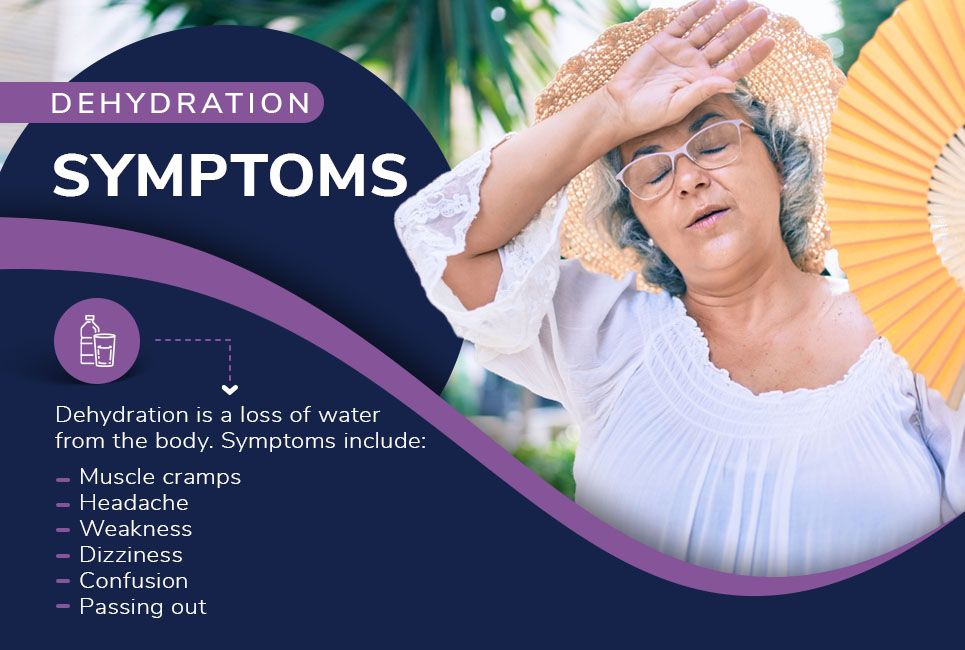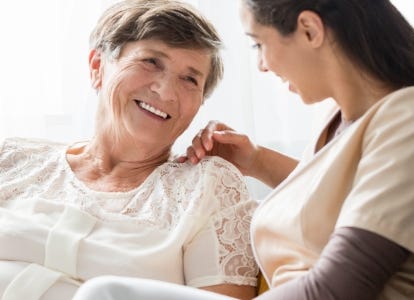Hot Weather Safety Tips for Older Adults
Seniors’ bodies don’t cope as well with heat as younger people’s bodies do, making them more vulnerable to all sorts of heat-related illnesses. With summer coming up soon, we’re shining a light on the potential hazards of the hotter months and talking about what older adults can do to protect themselves. In this guide, we’ll explain why older adults are more vulnerable to heat, break down the signs of heat-related illnesses and offer our top hot weather safety tips for older adults.
Why Seniors Are Vulnerable to Heat
Seniors are vulnerable to heat for multiple reasons. The first is that as we age, our body’s ability to sweat and to regulate our body temperature decreases. Some elderly people also have chronic health conditions that affect their ability to successfully cope with heat. Heart, lung and kidney diseases all increase your risk of heat-related illnesses.
Many medications taken by older people also increase susceptibility to heat. For instance, diuretics cause your body to get rid of water via the kidneys, potentially leading to dehydration. Beta blockers make it harder for your cardiovascular system to adapt to hot weather and other environmental stressors. Opioids and sedatives can reduce or eliminate awareness of physical discomfort and pain that prefaces heat-related illnesses.

Multiple classes of drugs — including antidepressants, antihistamines, phenothiazines and anticholinergics — act on an area of the brain that controls the skin’s ability to sweat, making it harder for your body to cope with heat. This is only a small sampling of drugs that might affect your ability to cope with heat.
Many seniors don’t experience the urge to drink as frequently, which can cause them to forget to hydrate. This may lead to dehydration or more serious heat-related illnesses if not caught and addressed early.
Seniors with cognitive impairments might not understand that they are experiencing a heat-related illness. Even if they are, they might not be able to communicate that they are not feeling well because of the heat. Cognitive decline can also impair someone’s ability to remember to stay hydrated, which can further worsen dehydration.
Hot Weather Safety Tips for Seniors
Wondering how to keep yourself or an elderly loved one safe this summer? Here are our 10 hot weather safety tips for seniors:

Avoid direct sun exposure.
Direct sun exposure can cause you to become overheated and lead to sunburn. Stay inside between the hours of 10 a.m. and 4 p.m. to minimize your exposure during the hottest parts of the day. Seek out shade if you must be outside while the sun is shining in full force. Wear a broad-brimmed hat and sunglasses to protect your face and neck. The skin there is very delicate and burns easily. Apply sunscreen with a protection level of at least SPF 30 to whatever skin isn’t covered by fabric and reapply every two hours to help guard against sunburn.
Seek out air conditioning.
In the heat of midday, fans usually aren’t enough to cut it when you’re trying to beat heat stroke. If your home has air conditioning, don’t be afraid to run it. If you don’t have central AC, see if you can install window units in your most frequently used rooms to help cool them down. If that isn’t a possibility, then go to public places that do have air conditioning during the hottest parts of the day. Malls, libraries and senior centers are all great options that are usually free to use.
Take other steps to cool down your home.
To help reduce your electric bill and lower the temperature of your house, you should also take other steps beyond just running the AC. Keep your blinds and curtains closed to stop the sun from heating up your house. Limit your use of the oven, dryer and other appliances that put out a lot of heat to evening hours. If you have fans, running them can help circulate the cool air from the AC and further lower the temperature, but they usually aren’t enough on their own.
Cool down with water.
Water is a great way to cool down when you feel the heat getting to you. Cold packs in the form of reusable gel pouches, a bag of frozen peas or frozen plastic water bottles can quickly drop your body temperature. Just be sure to put a layer of fabric between the back and your body to protect your skin. Taking a cold sponge bath or a cold shower before bed will help you cool down and drift off to sleep faster. And if you live near a pool or (better yet) the ocean, you can’t go wrong with a dip in the water to cool off.

Wear the right clothes.
Clothing that is non-breathable and traps heat can make you overheat fast. Choose loose, flowing adaptive clothing for women and men made of breathable fabrics such as cotton to help your body cool off during the summer. Keep in mind that any exposed skin is vulnerable to sunburn, so if you choose to wear short sleeves and shorts instead of long sleeves and men’s elastic waist pants, try to stay in the shade and wear sunscreen in order to protect your skin. Additionally, wearing all-weather clothing is another alternative to looking stylish and comfortable in different weather!
Shop Our Collection of Men’s Adaptive Clothing
Stay hydrated with water.
When it comes to staying hydrated, water is your best friend. Because seniors don’t usually get thirsty, you probably need to drink more water than you feel like you do. Ask your doctor how many ounces of fluid you should be drinking per day. You may want to add electrolyte fluids or powders to replace what you’re losing via your sweat. Try to limit your intake of alcohol, caffeine and other diuretics, which can contribute to dehydration.
Consider skipping outdoor activities.
During the hottest days of summer, it’s usually best to stay inside as much as possible and avoid the outdoors. If you absolutely must go out, time your outing for the very beginning of the day, when the temperatures are coolest. You can also go out after the sun sets, but keep in mind that evening is usually warmer than the early morning because the ground absorbs heat all day long and it takes time for that to dissipate.
Watch the weather reports.
Temperatures often vary day to day, sometimes by a significant number of degrees. Check your local weather reports to see which days of the upcoming week are predicted to be the coolest and schedule your activities for those days. Look out for reports of heat waves, rainstorms and other weather events that will significantly impact the temperature and plan accordingly.

Know the side effects of your meds.
If you are taking any medications regularly, even over-the-counter drugs and supplements, you should talk to your doctor or pharmacist about how they might affect your body’s ability to cope with heat. Like we outlined in the previous section, there are many ways that different drugs can make you more vulnerable to hot temperatures, so it’s important to know what to expect from each of the drugs that you are taking. However, don’t stop taking a drug unless your doctor instructs you to. Just because it makes you a little more vulnerable to heat doesn’t mean that it isn’t doing you good!
Act fast when you don’t feel well.
Heat-related illnesses can progress quickly if you don’t act fast. If you feel the first signs of dehydration or heat exhaustion (which we’ll talk about more in the next section), immediately stop what you are doing and find some place air conditioned to rest and hydrate. Go ahead and call your doctor if you think it’s something serious. They can advise you on whether it’s better to wait it out at home or if you should go to your local clinic or emergency room for immediate attention.
Signs of Heat-Related Illness
There are many different stages of potential heat-related illnesses. They usually start off more mild before progressing to more severe and potentially even life-threatening. Here are the signs and symptoms of five heat-related conditions to watch out for:

Dehydration
Dehydration refers to a loss of water from the body. Symptoms include muscle cramps, headache, weakness, dizziness, confusion and even passing out. Drinking sufficient water fortified with electrolytes will help to prevent dehydration or treat a mild form of it.
Heat exhaustion
Heat exhaustion occurs when dehydration is coupled with high temperatures. It may lead to heat stroke if left untreated. Symptoms include muscle cramps, weakness, tiredness, paleness, dizziness, headaches, nausea, vomiting, either heavy sweating or no sweating, cold and clammy skin, fast and weak pulse and fainting. Body temperatures may rise above their normal level as well. If you think you are experiencing heat exhaustion, immediately move somewhere cold and shady and begin drinking water. Call 911 if you don’t feel better soon or if you have a history of heat problems or high blood pressure.
Heat edema
Heat edema is swelling in the lower body caused by high temperatures. It is especially common in the feet and ankles. Wearing compression socks can help prevent edema, and elevating your feet on a pillow will help the fluids drain back towards your torso and reduce swelling.
Heat stroke
Heat stroke refers to a dangerous and potentially fatal rise in body temperature. It may be sudden, or occur gradually over several days. Heat stroke officially occurs when your body temperature goes beyond 104 degrees Fahrenheit (anything between 98.6 and 104 degrees Fahrenheit is considered heat exhaustion). If you or an elderly loved one is experiencing heat stroke, call 911 immediately. Move them to a cool, shady area and remove their clothes to help them cool down. Soak them with cool water or place cold, wet clothes on their neck, wrists, ankles and armpits. The evaporation will lower their body temperature more quickly. Only have them drink water or sports drinks if they are conscious and can swallow. Trying to give fluids to a drowsy person may cause choking.

Heat syncope
Heat syncope is fainting due to high temperatures. It may be preceded by dizziness or it may be more sudden. If you feel faint, lie down with your feet elevated and drink plenty of water to see if the dizziness abates.
Time to give your closet an update for summer? At Silverts, we offer a wide range of women’s and men’s adaptive clothing for all seasons, including the hotter months. Whether you need a breezy open-back t-shirt or a warm pullover sweater, we’ve got you covered with our stylish and affordable selection. U.S. orders over $20 ship free, so go ahead and stock up for the summertime!
Image Credits
Cube29/Shutterstock.com
single studio/Shutterstock.com
stockfour/Shutterstock.com
Krakenimages.com/Shutterstock.com
Photographee.eu/Shutterstock.com
gpointstudio/Shutterstock.com
Dmytro Zinkevych/Shutterstock.com
fizkes/Shutterstock.com





No Comments